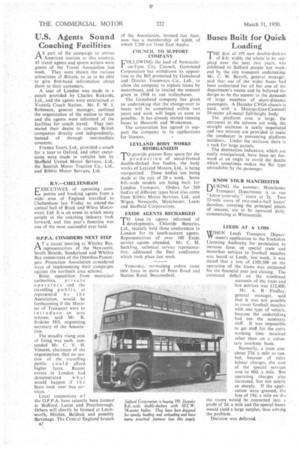Buses Built for Quick Loading
Page 36

If you've noticed an error in this article please click here to report it so we can fix it.
THE first of 195 new double-deckers of 8-ft. width, the whole to be supplied over the next two years, was exhibited to Salford people last weekend by the city transport undertaking. Mr. C. W. Baroth, general manager. said that use of the wider buses had been authorized for all but one of the department's routes and he believed the design to be the answer to the demands of large numbers• of short-distance passengers. A Daimler CVG6 chassis is used, with a Metropolitan-Cammell 54-seater all-metal full-height body. The platform area is large, the entrances to the saloons are wide, the straight staircase is easily negotiated and two mirrors are provided to assist the, conductor in preventing platform accidents. Under the staircase there is a rack for large parcels.
The destination indicators, which are easily manipulated, have been set forward at an angle to avoid the dazzle which sometimes makes the flat type unreadable by the passenger.
KNOW YOUR MANCHESTER
DURING the summer, Manchester Transport Department is to run " know-your-city " tours at 2s. Two 32-mile tours of two-and-a-half hours' duration, covering the principal places of interest, are to be operated daily, commencing at Whitsuntide.
LEEDS .AT A LOSS WHEN Leeds Transport Depart ment's application to the Yorkshire Licensing Authority for permission to increase fares on special tram and motorbus services to football matches was heard at Leeds, last week, it was stated that a loss of £103,500 on the operation of the trams was estimated for the financial year just closing. The estimated deficit on the combined accounts of the tram and bus services was £12,400.
Mr. A. B. Findlay. general manager, said that it was not possible to cover football matches with one type of vehicle, because the undertaking had not the necessary staff. It was impossible to get staff for the extra working time involved other than on a voluntary overtime basis.
Normally, a tram cost about 27d, a mile to run, but, because of extra labour charges, the cost of the special services rose to 60d. a mile. Bus operating charges also increased, but not nearly so steeply. If the application were granted, the loss of 19d. a mile on the the trams would be converted into a profit of 2d. a mile and the special buses would yield a large surplus, thus solving the problem. •
Decision was deferred.




























































































